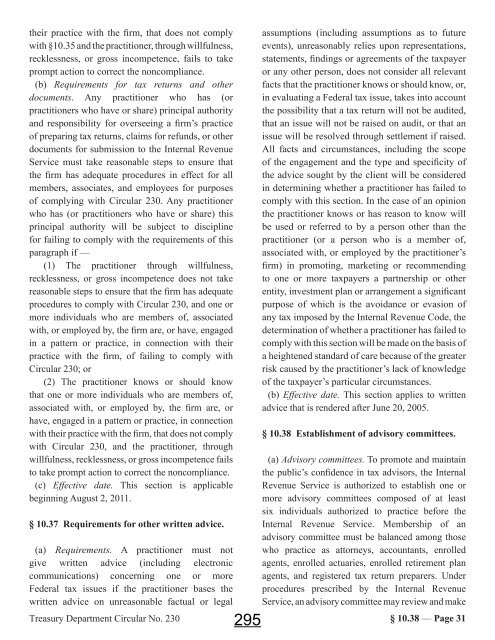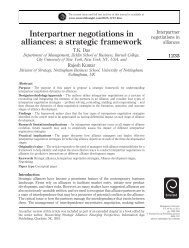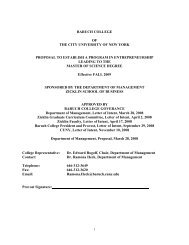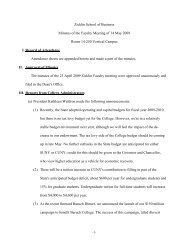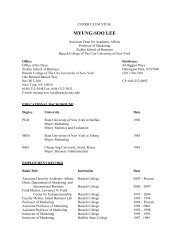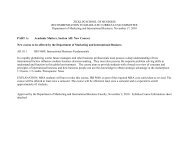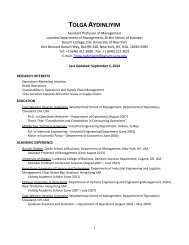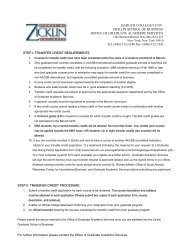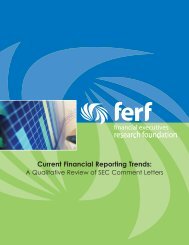Tax Seminar #3 – December 3 2012
Workbook - Zicklin School of Business
Workbook - Zicklin School of Business
You also want an ePaper? Increase the reach of your titles
YUMPU automatically turns print PDFs into web optimized ePapers that Google loves.
their practice with the firm, that does not comply<br />
with §10.35 and the practitioner, through willfulness,<br />
recklessness, or gross incompetence, fails to take<br />
prompt action to correct the noncompliance.<br />
(b) Requirements for tax returns and other<br />
documents. Any practitioner who has (or<br />
practitioners who have or share) principal authority<br />
and responsibility for overseeing a firm’s practice<br />
of preparing tax returns, claims for refunds, or other<br />
documents for submission to the Internal Revenue<br />
Service must take reasonable steps to ensure that<br />
the firm has adequate procedures in effect for all<br />
members, associates, and employees for purposes<br />
of complying with Circular 230. Any practitioner<br />
who has (or practitioners who have or share) this<br />
principal authority will be subject to discipline<br />
for failing to comply with the requirements of this<br />
paragraph if —<br />
(1) The practitioner through willfulness,<br />
recklessness, or gross incompetence does not take<br />
reasonable steps to ensure that the firm has adequate<br />
procedures to comply with Circular 230, and one or<br />
more individuals who are members of, associated<br />
with, or employed by, the firm are, or have, engaged<br />
in a pattern or practice, in connection with their<br />
practice with the firm, of failing to comply with<br />
Circular 230; or<br />
(2) The practitioner knows or should know<br />
that one or more individuals who are members of,<br />
associated with, or employed by, the firm are, or<br />
have, engaged in a pattern or practice, in connection<br />
with their practice with the firm, that does not comply<br />
with Circular 230, and the practitioner, through<br />
willfulness, recklessness, or gross incompetence fails<br />
to take prompt action to correct the noncompliance.<br />
(c) Effective date. This section is applicable<br />
beginning August 2, 2011.<br />
§ 10.37 Requirements for other written advice.<br />
(a) Requirements. A practitioner must not<br />
give written advice (including electronic<br />
communications) concerning one or more<br />
Federal tax issues if the practitioner bases the<br />
written advice on unreasonable factual or legal<br />
Treasury Department Circular No. 230<br />
295<br />
assumptions (including assumptions as to future<br />
events), unreasonably relies upon representations,<br />
statements, findings or agreements of the taxpayer<br />
or any other person, does not consider all relevant<br />
facts that the practitioner knows or should know, or,<br />
in evaluating a Federal tax issue, takes into account<br />
the possibility that a tax return will not be audited,<br />
that an issue will not be raised on audit, or that an<br />
issue will be resolved through settlement if raised.<br />
All facts and circumstances, including the scope<br />
of the engagement and the type and specificity of<br />
the advice sought by the client will be considered<br />
in determining whether a practitioner has failed to<br />
comply with this section. In the case of an opinion<br />
the practitioner knows or has reason to know will<br />
be used or referred to by a person other than the<br />
practitioner (or a person who is a member of,<br />
associated with, or employed by the practitioner’s<br />
firm) in promoting, marketing or recommending<br />
to one or more taxpayers a partnership or other<br />
entity, investment plan or arrangement a significant<br />
purpose of which is the avoidance or evasion of<br />
any tax imposed by the Internal Revenue Code, the<br />
determination of whether a practitioner has failed to<br />
comply with this section will be made on the basis of<br />
a heightened standard of care because of the greater<br />
risk caused by the practitioner’s lack of knowledge<br />
of the taxpayer’s particular circumstances.<br />
(b) Effective date. This section applies to written<br />
advice that is rendered after June 20, 2005.<br />
§ 10.38 Establishment of advisory committees.<br />
(a) Advisory committees. To promote and maintain<br />
the public’s confidence in tax advisors, the Internal<br />
Revenue Service is authorized to establish one or<br />
more advisory committees composed of at least<br />
six individuals authorized to practice before the<br />
Internal Revenue Service. Membership of an<br />
advisory committee must be balanced among those<br />
who practice as attorneys, accountants, enrolled<br />
agents, enrolled actuaries, enrolled retirement plan<br />
agents, and registered tax return preparers. Under<br />
procedures prescribed by the Internal Revenue<br />
Service, an advisory committee may review and make<br />
§ 10.38 — Page 31


